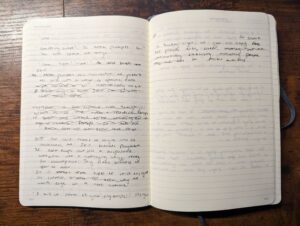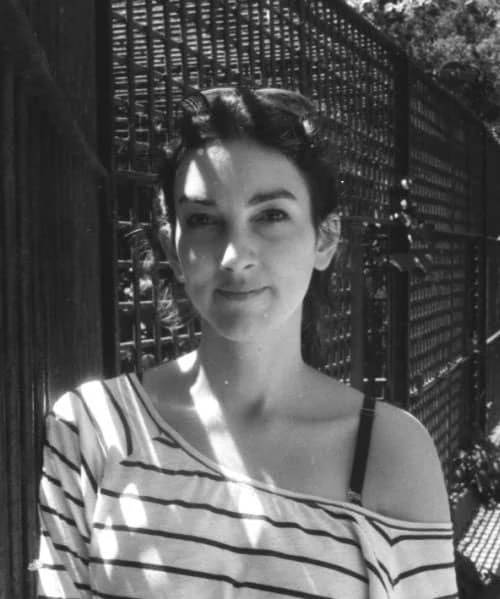
“Those Left Behind” by Kanishk Tantia is a thoughtful, gentle story about both humans and machines navigating grief, love, and loss in their own ways. At its heart, it is also a coming-of-age story for a machine, if machines can be said to grow up. It explores the way changes of context can reveal our programming and allow us to consciously shape our identity. Are we “beholden to our maps, indistinguishable from the ghosts who made us,” or can we, like HZ-12/Hari, decide who we wish to be?
Kanishk Tantia (he/him) is a BIPOC immigrant from India. His stories often involve plants, people, and plants eating people. Sometimes, they involve depressed robots. Find his work in Apex Magazine, Flametree Press, and Dark Matter Ink! Kanishk currently lives in San Diego with his awesome partner and a dog that commits tax fraud. Follow him on Twitter @t_kanishk or on his author website, kanishkt.com.
Marissa van Uden: Hi, Kanishk! Thank you for sitting down to talk with us today! This story was so touching in so many ways—full of sadness but also so much heart and beauty too. How did the idea for this Care Center for grieving humans come to you, and how did the story take shape from seed idea to its published form?
Kanishk Tantia: What an excellent question! I was thinking a little bit about how much I depend on my partner to function throughout the day, and vice versa. And that led me to thinking about a world where one of us isn’t around, and the other still has all these old habits and patterns imprinted into them, things they can’t and don’t want to change. Habits are a little bit like the memories of a person, aren’t they?
I was also thinking a lot about how we tend to pass difficult and unpleasant tasks to technology. Caring for the old is one of those tasks that, as a society, we kind of don’t want to think about or do. These two ideas came together to form the Care Center, but Rosh was never the main focus of the story. Hari always was.
MVU: Habits as memory of a person is such a beautiful idea, and it rings so true, that desire to hang onto them. It was fascinating to watch HZ-12 slowly parsing the difference between the strong emotions and feelings programmed into it via its neural map and its own intrinsic desires … and then deciding which elements from each to keep or discard. It reminded me of the process of moving between cultures or subcultures, getting to see aspects of yourself in a new context and more consciously reshaping who you are. Was that something you were thinking of while writing? Is some of this machine’s experience very relatable to you personally?
KT: To be honest, a fun thing that happens when people read my stories is they’ll come and tell me about the themes they find and what resonates most with them. I really love when that happens. One of my favorite stories (which hasn’t yet sold) is about a possessed ball of yarn. My friend tells me it’s clearly about climate change, and she’s right.
Was I consciously thinking about immigration and assimilation when I wrote this story? Maybe not. But Hari is very clearly code-switching, almost literally. And now that I’m thinking about it more, he absolutely is trying to differentiate who he is from what he’s expected to be, which is very much the immigrant experience. So, while I may not have consciously been thinking of the way in which immigrants deal with the dual cultural expectations, I absolutely see the influence now that you’ve pointed it out!
 Nova can’t read, but she’s very vocal about my writing anyway.
Nova can’t read, but she’s very vocal about my writing anyway.
MVU: I love that! It did resonate strongly with me, and I do always wonder what was consciously put there and what is more subconscious. The first story I ever read of yours was “I Promise I’ll Visit, Ma,” in the brilliant Monstrous Futures anthology edited by Alex Woodroe. In that story, a man is dealing with the loss of his mother, not just once but three times. It is a dark science fiction story, set in a quite horrific future, and yet like “Those Left Behind,” it is full of heart, family bonds, and the ways we seek to deal with grief and loss. What draws you to writing about these themes?
KT: I really like that anthology; it’s so full of thought-provoking and creepy stories! Alex did such a great job.
For me, “I Promise I’ll Visit, Ma” is a story about loss, but it’s also a story about moving on from loss. The protagonist, Yuri, dwells on his relationship with his mother, but he also builds a life around this loss. I would like to think that he has a happy ending, even if he has to suffer through losing his mother thrice.
Why am I drawn to these themes? Mainly because I think they resonate the most with readers. I want to write stories that stay with readers, and when I write stories, I try really hard to write the stories I would want to read and remember. I also, admittedly, gauge the quality of my stories on the basis of whether they make my partner cry.
MVU: What a wonderful measure. I’m glad you have your partner to help with this, even if you do break their heart a little. Your beautiful and devastating story “I Hear the Starwhale Sing” in Heartlines deals with those themes too, but it also weaves in the grief of animals who have lost their mates. The humans may not understand the creature or what it wants, but they do recognize that grief. Can you tell us a bit about the inspiration behind that story and how it took shape?
KT: “I Hear the Starwhale Sing” is definitely about grief, but it’s really about the inevitability of societal expectation. I was thinking about the Indian concept of “Dharma” or “duty” (which is a very, very loose translation), and how that can be unfair and burdensome. There are a lot of Chosen One stories, but I really wanted to write a Chosen One story where everyone is aware that the prophecy is a lie, but they go along with it anyway because it’s a necessary ritual.
In the first iteration of that story, the story was told from the perspective of the Starwhale, who saw the village grow up, go through times of famine, and eventually chose to sacrifice itself so the village had fuel and food. As I thought about the story more, I realized that this story wasn’t complete. It had barely started! I kept thinking about the impact an event like that would have on the village. That original story does make it into the final draft, as a story within a story.
 One of me and my partner: It’s not actually Venice, but maybe one day.
One of me and my partner: It’s not actually Venice, but maybe one day.
MVU: I love to know that the Starwhale’s POV exists out there somewhere. I felt very attached to that mournful creature! Could you tell us, what pieces of fiction, from childhood to more recent, have most impacted you as a writer, and what about these works spoke to you?
KT: Growing up, I read a lot of Indian mythology. There’s an Indian comic series called Amar Chitra Katha that basically goes through all the common Indian myths, and a lot of my early reading tastes in fantasy were formed by mythology. I also read a lot of Enid Blyton’s short stories, which were generally colonialist and moralist in nature, though I didn’t realize that back then.
I did read a lot of Western authors eventually. The usual suspects: Tolkien, Huxley, Asimov, Shelley, etc. A lot of the classics, because that’s what I could get my hands on at the library and online. I guess the base of my style is formed from this mixture of classic science fiction and fantasy and old Indian mythology.
If I had to pick a single author who influenced me the most, it would be Gaiman. I mean, reading Gaiman was a revelation. I didn’t think fairy tales could be as fascinating as he made them, or that mythology was something you could twist and remake. Recently, I’ve also been reading a lot of Mieville, and he has the same kind of revelatory impact. I read some of his work, and I think to myself, “Wait, you can do that? THAT’S AMAZING!”
It’s pretty basic stuff. No secret authors; it’s really just the top 40s of fiction.
MVU: Ha! Hey, they’re chart toppers for a reason! I noticed you are doing an awesome job of getting your stories out there, and you only started submitting in the last couple years, is that right? What does your writing routine look like? Do you have any rituals or rules for yourself that help you to sit down and write?
KT: Does self-hatred and depression count?
Honestly, I feel like I have been so lucky these last couple years. I’ve managed to find a good group of friends who are very willing to share honest feedback, and that helps more than anything else.
I mean, this isn’t mentally healthy, but I’m very motivated by external factors. I have three writing groups, they meet once a month, and that means I need to get a story ready every month at the minimum so I can submit and get crits. It’s a little bit of a trial-by-fire method of forcing myself to write things, but it seems to work.
 The land of abandoned ideas and drafts; almost nothing makes it out of here but it always gives rise to something better eventually.
The land of abandoned ideas and drafts; almost nothing makes it out of here but it always gives rise to something better eventually.
MVU: I’m sure many writers can relate! And yes, writing groups are a fantastic source of pressure to write.What is some of the best writing advice you’ve been given that really works for you?
KT: When I first started writing, I asked a couple people a question that seems so silly now. “Hey, what’s your writing setup to maximize productivity? Do you guys type, or use a notebook, or what?”
I got a lot of good advice on what tools are good. But the best piece of advice I got was from someone who has become a really good friend.
“You’re trying to feel productive without being productive. Stop bullshitting and go write something.”
I was very embarrassed, but he was absolutely right!
MVU: Honest friends are the best! Great advice. I discovered from your website that you are lucky enough to live with the best dog in the whole world! I love this for you! Tell us about your dog. How did you meet, what is her name, and is she a good writing companion?
KT: Nova is a kitchen-sink mutt that we adopted about two years ago. She has maybe half a braincell on a good day, a bunch of skin conditions, anxiety, and glaucoma. I love her so much.
She is also addicted to attention, and will happily headbutt me, whine, paw at me, or really do anything she can to get my attention. So, she is a terrible writing companion, actually, but she’s so cute that I can’t hold it against her.
MVU: We are all beholden to the cuteness! For readers who loved this piece, I can suggest and strongly recommend they read your wonderful flash piece “For As Long As You Want It” in Apex Magazine. Can you let them know where else to find your work or any upcoming publications? And can you give us a hint about anything exciting you’re working on at the moment?
KT: Well, the best place to know if I have something coming out is my Twitter, @t_kanishk. My website, kanishkt.com, has a list of my currently published work with links to either free online copies or places you can purchase anthologies. I try to keep it as updated as I can!
I know a lot of people have books in the works. I don’t, I haven’t the attention span for a whole book!
For stuff that’s coming down the pipeline, there’s a couple short stories and one nonfiction piece I’m very excited about that I can’t talk about yet. But the one I can mention is that I’m working on a little Solo RPG called “Plane: Teleporter Operator.” I wrote a lot of prompts and character work on this one, and Tina Alberino from The Dread Machine did the majority of the design-heavy lifting. We have a Kickstarter page here: Plane: Teleporter Operator Simulator, a solo journaling RPG. by Alin Walker — Kickstarter.
MVU: Thank you so much for joining us today.









